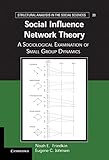Social influence network theory [Texte imprimé] : a sociological examination of small group dynamics / Noah E. Friedkin, Eugene C. Johnsen
نوع المادة : نصالسلاسل:Structural analysis in the social sciences (Cambridge University Press, Cambridge)تفاصيل النشر:Cambridge ; New York : Cambridge University Press, 2011وصف:1 vol. (XXI-367 p.) : ill. ; 24 cmتدمك:
نصالسلاسل:Structural analysis in the social sciences (Cambridge University Press, Cambridge)تفاصيل النشر:Cambridge ; New York : Cambridge University Press, 2011وصف:1 vol. (XXI-367 p.) : ill. ; 24 cmتدمك:- 978-1-107-00246-3
- 302.34 23E
- 302.3
| نوع المادة | المكتبة الحالية | رقم الطلب | رقم النسخة | حالة | تاريخ الإستحقاق | الباركود | |
|---|---|---|---|---|---|---|---|
|
|
Bibliothèque centrale En accès libre | 302.3 / 506 (إستعراض الرف(يفتح أدناه)) | 1 | المتاح | 000005520473 |
Bibliogr. p. 343-361
"Social influence network theory presents a mathematical formalization of the social process of attitude changes that unfolds in a social network of interpersonal influences. This book brings the theory to bear on lines of research in the domain of small group dynamics concerned with changes of group members' positions on an issue, including the formation of consensus and of settled disagreement, via endogenous interpersonal influences, in which group members are responding to the displayed positions of the members of the group. Social influence network theory advances a dynamic social cognition mechanism, in which individuals are weighing and combining their own and others' positions on an issue in the revision of their own positions. The influence network construct of the theory is the social structure of the endogenous interpersonal influences that are involved in this mechanism. With this theory, the authors seek to lay the foundation for a better formal integration of classical and current lines of work on small groups in psychological and sociological social psychology"-- Provided by publisher
Machine generated contents note: Part I. Introduction: 1. Group dynamics: structural social psychology; 2. Formalization: attitude change in influence networks; 3. Operationalization: constructs and measures; 4. Assessing the model; Part II. Influence Network Perspective on Small Groups: 5. Consensus formation and efficiency; 6. The smallest group; 7. Social comparison theory; 8. Minority and majority factions; 9. Choice shift and group polarization; Part III. Linkages with Other Formal Theories: 10. Models of group decision making; 11. Expectation states and affect control; 12. Individuals in groups; Epilogue; Appendices
لا توجد تعليقات على هذا العنوان.


